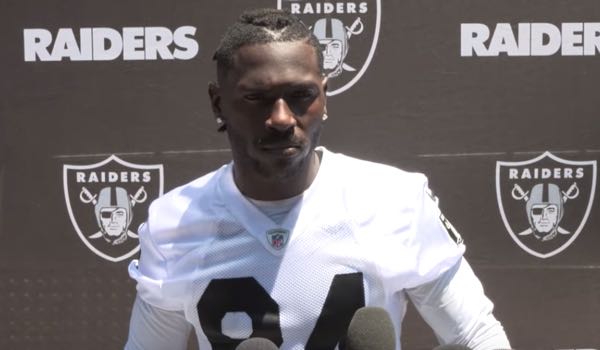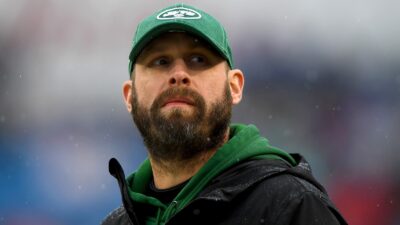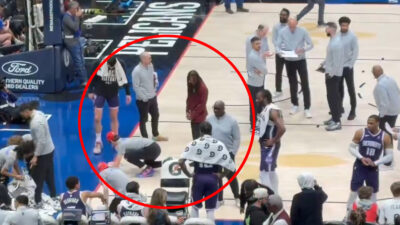
Will the Oakland Raiders consider filing a tampering grievance against the New England Patriots over Antonio Brown? They might have a very good case if they pursued one.
A review of the timeline of events that led to Brown’s release by the Raiders and subsequent signing with the Patriots leads to questions about Brown’s motivations, and when he learned of the Patriots’ interest in his services.
We will go through the timeline of Brown’s brief time with the Raiders and examine at what points things changed and whether tampering took place.
In March, Brown forced a trade out of Pittsburgh to the Oakland Raiders. Brown wanted a new contract, new team, and even reportedly rejected a trade to the Buffalo Bills. The Raiders were a team he approved, and they gave him the contract he wanted. He had no reason at that point to be anything but fully invested in playing for Oakland. He even promised a “new standard” and to change the culture in Oakland when he was introduced on March 13. He seemed to be all-in with the team.
Brown missed the first day of the team’s OTAs in May but was present for the second day. He still seemed to be in good standing.
Then came training camp. Brown had his cryotherapy frozen feet issue that kept him from practicing. He refused to play without his outdated helmet and filed two grievances with the league about it. Jon Gruden seemingly stood behind him the entire time.
Then everything unraveled this week.
Wednesday
The Raiders notified Brown that he had been fined for missing a walkthrough on Aug. 22. The end of the fine letter warned Brown that he could face additional penalties for conduct detrimental to the team. This was the Raiders creating a paper trail and laying groundwork to potentially void Brown’s contract, which called for him to receive $30 million guaranteed through 2020. Brown was upset about the note and posted a photo on Instagram about it, ripping the Raiders.
Thursday
Brown and Raiders GM Mike Mayock had an exchange over the fine and letter. A report said Brown called Mayock a “cracker,” but Brown denied that report. A few reports afterwards said the Raiders were planning to suspend Brown. Then there was speculation the Raiders were planning to void Brown’s contract. A report later on Thursday said the Raiders were not planning to play Brown in Week 1. The Raiders were under time pressure: they had to suspend Brown by their first game otherwise his contract would become guaranteed.
Friday
The power balance seemed like it had swung back in the Raiders’ favor and like they were in control. Brown’s agent Drew Rosenhaus said he was trying to repair the relationship between his client and the team. Brown even reportedly apologized to the Raiders on Friday. Gruden then said Brown would play in Week 1 on Monday night.
Then late on Friday, word emerged that the Raiders had fined Brown for his exchange with Mayock, essentially stripping him of all the guaranteed money he had been paid and was owed. Brown then posted a video to YouTube Friday night that contained audio of a phone conversation with Gruden.
Saturday
Brown posts on Instagram asking the Raiders to release him rather than have him play week-to-week with no guaranteed money. Brown says there is “no way” he will play for the Raiders under those conditions. The Raiders complied shortly thereafter and announced they had officially released Brown. Rosenhaus said he would work immediately on finding Brown a new team and new beginning.
This was Brown’s reaction to being released:
Why would a man celebrate being released from a contract that was going to pay him $14 million over the rest of the season? Brown had $30 million reasons to get his act together with the Raiders and apologized to the team on Friday, likely to preserve his shot at making that money.
Doesn’t it seem odd that he would be so happy about having no contract a day before most teams were set to play? But if Brown knew what offers awaited, and that a preferable destination — for potentially the same amount of money — were possible, he probably would be celebrating.
About five hours after his release from the Raiders, reports said Brown had agreed to a one-year deal with the Patriots that would pay him $10 million guaranteed and up to $15 million. Brown was set to earn about $15 million guaranteed this season.
The number of teams interested in Brown after all his Raiders antics almost assuredly had dwindled. The Saints said they had no interest. The Bills were on record laughing about it. How would he know all would be well unless he had been told an offer from a preferable destination awaited?
The Patriots were at the center of some tampering allegations over Martellus Bennett in 2017. They traded tampering allegations with the Jets in 2015 over Darrelle Revis. In June, the Patriots filed tampering charges against the Texans over Houston’s pursuit of Nick Caserio. The charges were later dropped after the teams worked out an agreement.
The NFL defines tampering as: “any interference by a member club with the employer-employee relationship of another club or any attempt by a club to impermissibly induce a person to seek employment with that club or with the NFL.”
Here’s the section of the league’s anti-tampering rules that would apply in this case:
“If a club is contacted by a player (or his representative) who is under contract to or whose negotiating rights are held by another club, and such player has not been given permission to negotiate with other clubs, or such player is not in a permissible negotiating period under the terms of an operative collective bargaining agreement, then the contacted club is prohibited from (i) negotiating with the player or his agent; (ii) discussing even in general terms the player’s possible employment with the contacted club; or (iii) discussing the player’s contract or his potential or ongoing contract negotiations with his current club.
“In addition, the contacted club representative must inform the player or his representative that under NFL rules the club is not permitted to discuss such matters, and, if such matters are raised by or with the player or his representative, the club representative must immediately report such contact to the owner or operating head of the club that holds the player’s rights.”
If the Raiders wanted to file a tampering grievance, they probably could. The league could ask to see Drew Rosenhaus’ digital communications with the Patriots and see whether any conversations took place before Brown had been released. Or maybe the Raiders will just decide to move on quietly and be done with Brown.













